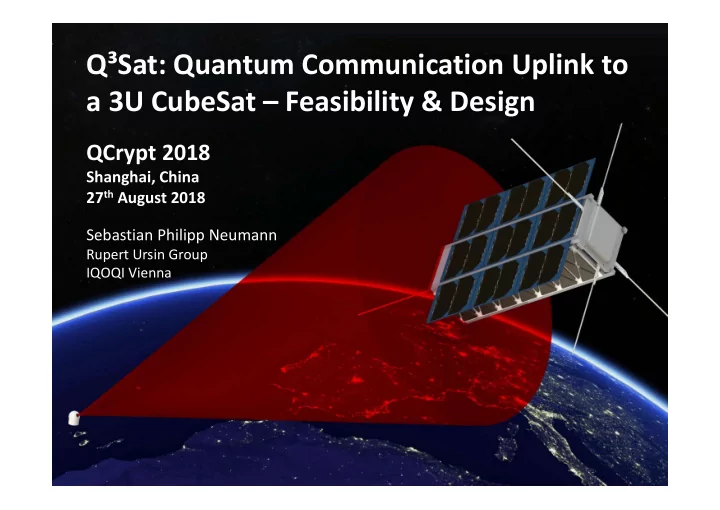

Q³Sat: Quantum Communication Uplink to a 3U CubeSat – Feasibility & Design QCrypt 2018 Shanghai, China 27 th August 2018 Sebastian Philipp Neumann Rupert Ursin Group IQOQI Vienna
Overview • Q³Sat mission setup • Why a CubeSat? • Satellite design • Choice of orbit • Crucial parameters for high SNR and key rate • Expected performance 04/09/2018 sebastian.neumann@univie.ac.at 2
Uplink Mission Setup Why uplink? - Simple setup on satellite - Usable for several protocols 04/09/2018 sebastian.neumann@univie.ac.at 3
Why a CubeSat? 3U: 10x10x34cm, 4kg; ideal for precursor missions Figures: CubeSat design specification sheet by CalTech and http://spaceflight.com/schedule-pricing/ 04/09/2018 sebastian.neumann@univie.ac.at 4
CubeSat-Design 04/09/2018 sebastian.neumann@univie.ac.at 5
Block diagram 04/09/2018 sebastian.neumann@univie.ac.at 6
Preliminary CAD drawing 04/09/2018 sebastian.neumann@univie.ac.at 7
LEO Orbit Calculations LEO: Link duration calculations by group - 500 km - >30° elevation of Carsten Scharlemann (FH Wiener - night only Neustadt): 04/09/2018 sebastian.neumann@univie.ac.at 8
Signal-to-Noise Ratio > 4.8 for Bell test > 8.8 for QKD • � ��� ∝ 2� � � �� � accidental rate • � ��� = Λ� � � ��� optical error counts • Λ : total loss • �: coincidence window • � �� : noise count rate • � � : pair rate • � ��� : optical errors Λ ~ 60dB low � �� and short � are crucial! 04/09/2018 sebastian.neumann@univie.ac.at 9
Noise Counts • Dark counts: radiation tiny 20 μ m detectors, shielding optional thermal passive cooling in total max. 200 cps per detector E. Anisimova et al. , “Mitigating radiation damage of single photon detectors for space applications,” EPJ Quantum Technology , vol. 4, no. 1, p. 10, 2017. 04/09/2018 sebastian.neumann@univie.ac.at 10
Attitude Control: XACT • Background counts: prop. to field of view (FOV) has to be as small as possible (~100 μ rad) Pictures + table from www.bluecanyontech.com Space heritage, ~40μrad precision without tracking! In total, � �� ~ 480 cps (zenith) 580 cps (30° elevation) 04/09/2018 sebastian.neumann@univie.ac.at 11
Coincidence Window • for E91 (entangled photon pairs): – On ground: Superconducting nanowire SPD, 19ps jitter (rms), “no” dark counts – On CubeSat: PDM: 35ps jitter, <5Hz dark counts – Time taggers: 3ps on ground / 20ps on Q³Sat � � � � � ��� = 2 � ��� + � ���� + � ���� + � ����� = ���� • for DSP (decoy): – No detection on ground necessary, just limited by electronics � ��� = ���� 04/09/2018 sebastian.neumann@univie.ac.at 12
Trade-Off SNR vs. R sec 04/09/2018 sebastian.neumann@univie.ac.at 13
Link Quality Total key per year: 13 Mbit 20€ /kbit (launch & hardware only) � � : Fried parameter Fried parameter data taken from http://catserver.ing.iac.es/robodimm/ 04/09/2018 sebastian.neumann@univie.ac.at 14
Performance • 71 435s link time / year – 13.0 Mbit / year with decoy – 4.0 Mbit / year with E91 • Launch + material cost: 500k€ 20 € / kbit assuming lifetime of 2 years, but low threshold costs 04/09/2018 sebastian.neumann@univie.ac.at 15
Publication 04/09/2018 sebastian.neumann@univie.ac.at 16
Co-Authors Siddarth K. Joshi Matthias Fink Thomas Scheidl Rupert Ursin Carsten Scharlemann Erik Kerstel Sameh Abouagaga Mathieu Barthelemy Daanish Bambery Thank you for your attention! 04/09/2018 sebastian.neumann@univie.ac.at 17
Recommend
More recommend